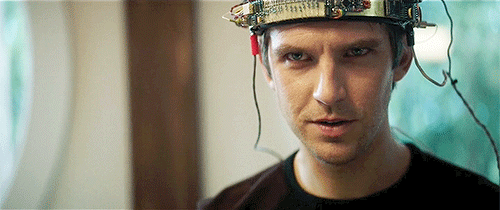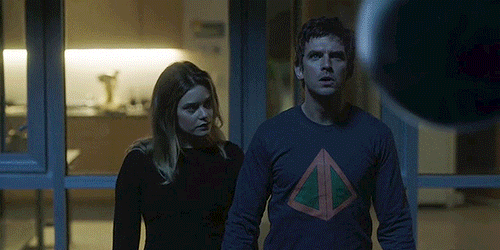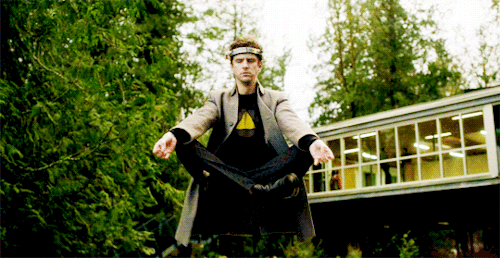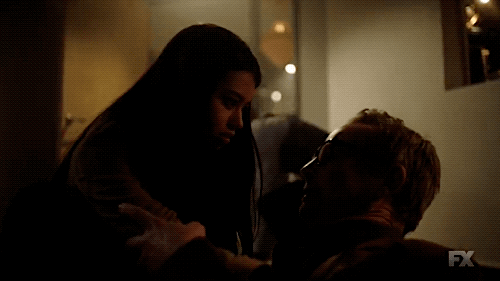At this point it’s clear just how much I’ve enjoyed Legion’s first season. Really, I’m still surprised at just how good it is. It’s been fun, it’s been engaging, it’s been deep, and every week I find myself surprised in a good way about something Legion succeeded with. Living up to the past couple episodes was a hard task. The finale did not meet that standard, which has disappointed some.
How much does it ultimately affect the season as a whole? Very little. Time to gush about my new favorite comic book show’s incredible debut season.
Spoilers for 1×08 “Chapter 8” and the rest of Legion’s first season

Review
Those who have watched Fargo (and for those who haven’t, why not???), you’ll probably recognize the issue with this finale. It was the same issue plaguing Fargo’s second season finale. Legion spent so many episodes ratcheting up the tension and stakes. Each new episode continuously topped the one before it. Eventually this left the penultimate episode with no choice but to resolve the season’s plotlines.
There’s nothing wrong with this approach, but it left Legion and Fargo with the same problem come time for the finale; neither could really raise the stakes of the finale where they needed to be. As such Legion was left with a season finale which felt more like a table-setter rather than a table-cleaner.
With the Shadow King neutralized and David in some semblance of control over his powers, this episode had to rush through a hastily created conflict worthy of a finale. On their own these conflicts were fine. Division 3 was always going to return and Farouk was always going to bust loose. The problem was trying to fit both these plot points into one episode, and a short one at only 45-minutes. Neither really received the attention they deserved.
Legion probably could have used a couple more episodes to properly handle this aftermath, or one less so last week could serve as the finale. This is a strange new problem for a comic book show, fitting considering the many differences of Legion compared to its fellow comic shows. A common criticism of the Marvel Netflix shows has been the way they grind to a halt in order to stretch 10-episode stories over 13. Even the wonderful Daredevil and Jessica Jones had this issue.
Noah Hawley had too much story crammed into too little time.
Think of how perfect a premiere this could have been. Summerland creates an uneasy alliance with Division 3. We learn more about Division 3’s strength and backing. The Shadow King and David clash and Farouk escapes in a new host. You’d have your new conflict for the season perfectly set-up.
(Though I suppose that leaves out the Pokeball capturing David during the credits scene. But as of now I don’t have any thoughts on that besides, “huh?”)

As is you’re left with a finale which didn’t live up to the consistently increasing quality of the 3 or 4 episodes preceding it. The rushed nature of it doesn’t jive with the rest of the season and it stood out.
Still, less than perfect Legion is still really good. The Farouk-vacuum scene was incredible. Whatever the rushed nature of the plot, the character arcs ended quite nicely. Division 3 was properly humanized, if a bit cliché. All the season 2 set-up certainly created interest for the next season. It was a solid episode of a very good show.
And while I may have wanted more time on it, the Farouk segments were really quite excellent. Aubrey Plaza again knocked her role out of the park and showed a bit more range in the process than she had so far. The execution of Farouk’s escape was awesome. I do have questions about how exactly the power exchange worked, but I can let that go. I also loved how the priorities of each of the characters throughout the episode, and how those priorities lined up well with their established personalities.
I’m a sucker for characters who always act exactly as previous characterization suggests they should. Apparently it’s a lot to ask these days.
Just like Fargo’s relatively lackluster finale did little to detract from the second season’s brilliance, Legion’s finale will hardly distract from the rest. This was a fantastic season of television. And what’s more, it set a new standard for comic book shows everywhere. Legion is most certainly not for everyone. Plenty of people will watch this and be turned away. They’ll prefer Daredevil’s examination of vigilantism, Jessica Jones’s exploration of trauma, or the optimistic tone of Supergirl.
I won’t say anyone is wrong to prefer those shows, or any other, to Legion. What Legion definitely did, though, is up the standards for what is expected of the production around a comic book show. The effects, the direction, the creativity, the acting, the careful unweaving of a complicated plot centered on the mind; Legion went somewhere different than any other show before it. It paved that way with a style and skill that, as much as I love those other comic book shows, none of them has compared to.
We’ll have to see whether Hawley can keep such a complicated plot compelling over multiple seasons. Even if Legion drops the ball and lets it roll back downhill in future seasons, we will always have this. Season 1 was an incredible, thrill ride of creativity that has raised the bar for comic book shows and TV in general. It did so many things right.

The Main Character Rocks
As you’d expect of a show so centered on one person, David Haller stands tall among Legion’s many triumphs. It goes beyond Dan Stevens somehow pulling off every single personality change, though performance certainly helps. Somehow, on a show so dependent on the unreliability of the narrator, Legion managed a consistent, compelling, and likable main character with well-executed arc.
We were introduced to David Haller’s troubled life in the opening scene and saw his history taken apart and examined bit by bit. I still struggle to believe how well they related his history and examined the traumas within. Like many I worried his trauma would be forgotten by the time the finale rolled around. Most fans probably expected the typical hero’s journey. “You were never sick. You just have powers! How about that, you’re suddenly over 20 years of hardships!”
David Haller bucked those expectations. I couldn’t possibly cover everything Legion did so well with his character here. You can’t possibly erase 20 years of thinking David believing he was mentally ill. He spent the majority of his life tortured by the Shadow King’s presence in his mind. He wanted nothing more than a normal life. A girlfriend, friends, stability of body and mind. There’s a reason he was content with the Clockworks Farouk created. It gave him everything he wanted.
Rather than having the finale reveal a David Haller whose problems vanished with mastery of his powers, that mastery only seemed to play on his insecurities even more. He knew no life without Farouk’s presence in his mind. What happens if Farouk is successfully removed and nothing changes? What if David really is mentally ill and he can’t attribute everything to his powers? David’s instability never disappeared, because it never should have.
While we may not have seen the main reason why those issues will not vanish this season, we probably will in season 2. Let’s just say his issues extend well beyond the hold Farouk had on his mind.
David Haller was a fantastic character to follow throughout this season.
So Do His Friends
His supporting cast was pretty great as well. The Summerland gang may have started out as a monolith united in helping David realize his powers, but by the end of the season almost everyone had been fully fledged out, with their own motivations and concerns separate from each other. Melanie was concerned with her husband above even the war with Division 3 and humanity. Sydney sided early with David above all else. Oliver tried to escape and find himself again. Ptonomy’s fear of him was made clear quickly and only increased. The final episode even made Division 3 relatable, though I’ll admit it was in the most cliché, manipulative way they could.
I’ve gushed a lot about the Loudermilks, and they deserve their own focus here because they are easily the most interesting of the side cast. Cary and Kerry were absolutely incredible. Kerry in particular surprised me; her first extended appearance struck me as shallow, but she developed right alongside her brother/host while taking her own direction.
I’ve said before how there’s a conversation to be had about gender identification with these two. A woman who lives inside a man’s body only begs for the conversation. The past couple episodes saw how both of them struggled while separated. Kerry blamed Cary for abandoning her, for leaving her alone. Her identity has always been as the stronger of the two, as the fighter. She hated how weak she felt by herself, which showed her how dependent she truly was on Cary.
Cary handled it no better, as he has grown to rely on his sister/female side. He felt literally empty without her. These past two episodes saw him all but beg her to return. He needed her just as much as she needs him. Together the two of them raise some talking points about the gender of an individual. Kerry can represent the female side of Cary which fights for existence while finding comfort in escaping back into a male body, while Cary’s dependence on Kerry represents a dependence on the true self living within him.
At the same time, they each have their personalities and interests which allow them stories and scenes independent of each other. Cary and Kerry are fascinating and run a surprisingly competitive second place to David as my favorite part of Legion.

All’s not perfect with the supporting cast, though. I like Sydney, but her relationship with David is too perfect. She also has little to no story outside of him. I hope that changes in season 2. I’ve had consistent complaints about Ptonomy which were never addressed at any point. The guy damn near vanishes after the initial episodes. He only shows up to voice fear of David and carry a tommy gun from time to time.
I’m also not the biggest fan of how Legion chose to create sympathy with Division 3. Simple fear of mutants works just fine in my opinion. As the interrogator said, mutants are gods that can decide at any time not to listen to humans anymore. And I don’t have an issue with the interrogator having a family, of course. It was just surprisingly heavy-handed for Legion to spend so much time on his husband and son, as if they wanted to bludgeon the audience with empathetic material.
Yeah, everyone has a family. You don’t need to cave my head in with it.
A Villain for the Ages
I said this a couple weeks ago, so anyone reading my reviews should know how much I LOVE Aubrey Plaza as Amahl Farouk, the Shadow King. Legion’s gradual reveal of Farouk, his motivations, his history with David, and his control over him were fantastic. His fat demon form was properly terrifying. Plaza did wonders to inject charisma into the character. The full focus on the demon during the two episodes in fake Clockworks made for the best episodes of the season.
As much as I already loved Farouk as a villain, the finale cemented this character as one of the best villains I’ve ever seen.
Earlier I mentioned Plaza’s range in the role, which I think has gone underappreciated. She’s done more than simply chew scenery (though she’s done that quite entertainingly). She was manipulative in the early episodes. When Farouk needed fear, she showed fear. When Farouk took control, Plaza easily transitioned between the calm therapist at fake Clockworks and frightening power. As the illusion broke down, she reached all new levels of terrifying horror monster.
Most of all, though, Legion and Plaza did something wonderful with Farouk’s final scene in Oliver’s car. They showed a villain in mourning. It wasn’t just the loss of power the Shadow King missed. This character spent 30 years inside David’s head. It melded with him at every level. This mutant lost a significant portion of his life by separating from him. Now Farouk has to start an entirely new chapter of his life. He lost something important to the mutant he had become.

I expect you’ll see David struggle with this as well. He has also lost a significant portion of what made him. For the better, of course, but just because something was a negative influence on your life does not mean you won’t miss it. David and Farouk will miss each other.
This villain was amazing in so many ways. I expect we’ll see him vanish for a while, along with Oliver. One of my biggest worries about future seasons is just how Legion will move on from a villain so central to the success of the show. Along with Lorne Malvo from Fargo, Noah Hawley has now created two of the very best villains I’ve ever seen.
Final Verdict
If you haven’t watched Legion, well, I’m not sure why you would be reading this. And for the supposed majority who have, recommend this show. Recommend it to everyone, whether they like comic book shows or not. I have put a few people with zero interest in superheroes onto Legion, and they love it.
This is more than a good comic book show. Legion will go down as one of the very best shows this year.
It’s as creative as anything I’ve ever seen. It has wonderful characters. The story is a brain-twisting delight. Various genres blend in and out from episode to episode with triumphant results. This first season almost felt too good. How in the world can Legion improve on this? What direction can it go that matches the standard set here?
Maybe it can’t. Maybe this was the best Legion will ever be. I have much more faith in Noah Hawley than that, but it’s very possible. Shows like this have been known to lose control over the years as the complicated plots spin out of control. Legion very much risks following that example.
We’ll always have this, though. No matter what comes, we will always have this one crazy, creative, entertaining season which forever changed the way I will look at comic book television, and television as a whole.
Images Courtesy of FX

